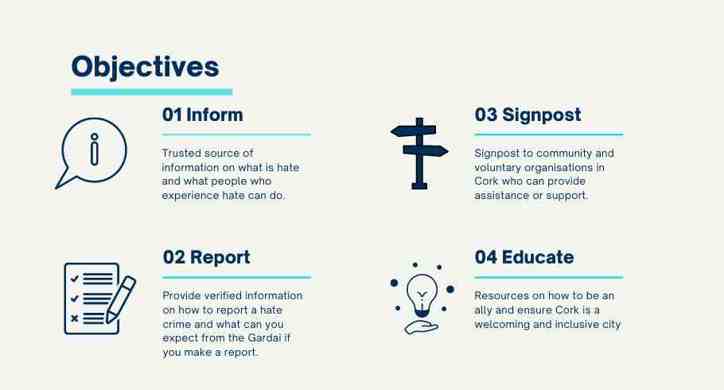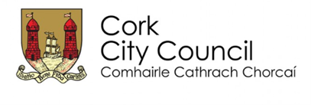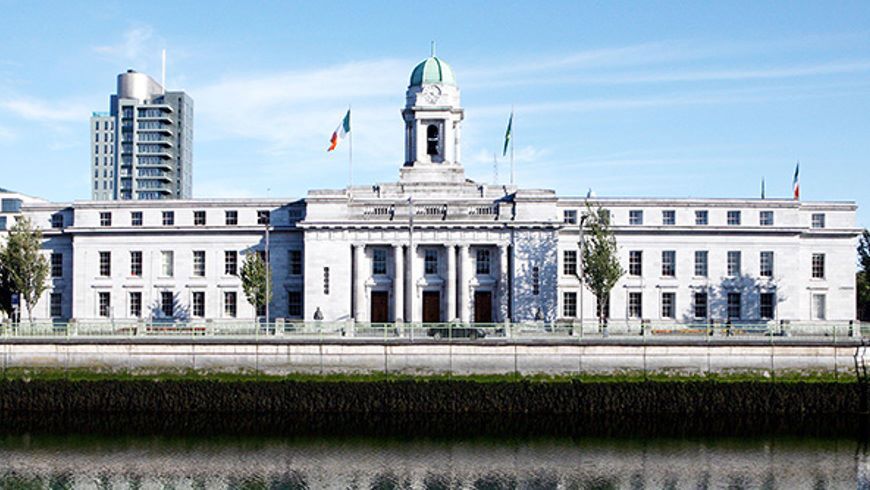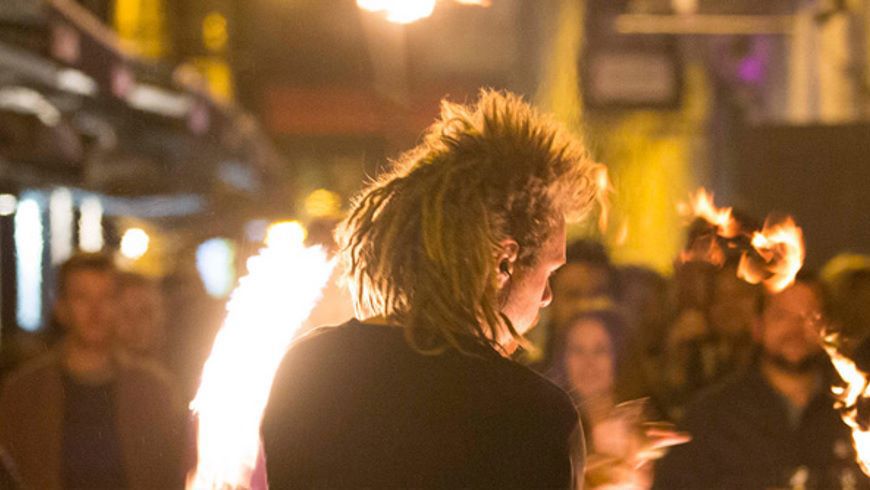Hate Crime Information
1. Inform 
What is Hate Crime?
Until Hate Crime legislation is passed by the Oireachtas, An Garda Síochána define a Hate Crime in Ireland as “any criminal offence which is perceived by the victim or any other person to, in whole or in part, be motivated by hostility or prejudice, based on actual or perceived age, disability, race, colour, nationality, ethnicity, religion, sexual orientation or gender.” In simple terms, this means that there are two elements to a Hate Crime - firstly a criminal offence must have occurred and secondly the offence must have been motivated, fully or in part, by hostility or prejudice (hate).
Some examples of Hate Crimes include, intimidation, threats, assault, harassment, criminal damage to your property, manslaughter or murder.
A person, community or institution may be a victim of Hate Crime by virtue of perceived or actual association with a particular group or background.
What is a (Non-Crime) Hate Incident?
A Hate Incident is an incident which is motivated by hostility or prejudice (hate) but which doesn’t reach the threshold for criminality. An Garda Síochána define Hate Incidents as “non-criminal offences which are perceived by any person to, in whole or in part, be motivated by hostility or prejudice, based on actual or perceived age, disability, race, colour, nationality, ethnicity, religion, sexual orientation or gender.” These protected characteristics may be amended further in upcoming legislation. Some examples of Hate Incidents include verbal abuse, text, mail or emails or low-level harassment.
A Hate Incident can sometimes be dealt with under anti-discrimination laws if the incident is related to discrimination in accessing good, services, accommodation or employment and you fall under one of the nine (ten for housing) categories of protected people. The IHREC have developed a useful guide if you would like to find out more about your rights.
2. Report a Hate Crime 
How do I report Hate Crime to the Gardaí?
- In Person at your local Garda station. Click through to see a full Garda station directory.
You will be attended to by a Garda who will listen to you and if you wish will then record your statement. A statement is required in order to start a Garda investigation. The Garda will commence an investigation, by gathering evidence. This may involve taking statements from all parties involved.
- Use the newly established Garda Online Hate Crime Reporting Service for people who wish to report a Hate Crime, who otherwise may be reluctant to report in person. This service should only be used in non-emergency situations.
- Use the Garda Confidential Line on 1800-666111
- Contact your local Garda Diversity Officer
There are currently 331 Garda Diversity Officers, who are trained and supported to actively engage with and attend to the concerns of minority, diverse, and hard to reach communities.
Can I report a Hate Crime to the Gardaí if I am a minor?
- Yes, you can report any incident at any age in the presence of a parent or guardian.
Can I report a Hate Crime to the Gardaí on behalf of someone else?
- Yes. Anyone can make a report. Once consent is given, the Gardaí will then get in touch with the injured party (victim), who can then make a statement of complaint for the investigation to begin.
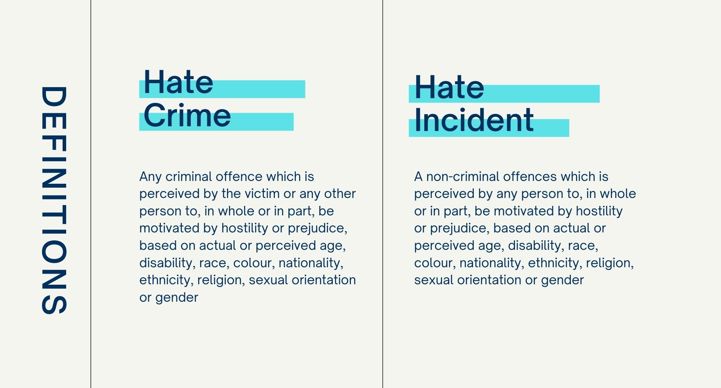
Additional Hate Crime Information
- Click through for Hate Crime Information Leaflets (English).
- For more information on Hate Crime visit Diversity and Integration Unit Web Page including Hate
Crime leaflets in 18 additional languages.
- Click through for informational video on Hate Crime Reporting Service.
- Click through for Garda Let’s Stop Hate Together campaign video.
3. Signpost 
What other resources are available to help?
- The Irish Human Rights and Equality Commission (IHREC) have very helpful guides on your rights and what remedies are available to you if you have been discriminated against on one of the nine equality grounds when accessing goods, services, education, or accommodation.
- Nasc, Migrant and Refugee Rights Centre have Anti-Racism Toolkits for Schools and are part of a National Coalition Against Hate Crime.
- The Cork Migrant Centre are developing Anti-Racism resources for schools, teachers, and workplaces.
-
SALAAM Know Your Rights Campaign - SALAAM is the Sustainable Alliances Against Anti-Muslim Hatred. They launched the 'Know Your Rights Campaign' in June 2024 which features information on the Equal Status Act, the Victims Directive, and the Public Sector Duty. You can download their poster here:
- BelongTo have a digital toolkit for schools who wish to take a stand against homophobic, biphobic and transphobic bullying.
- Additional National LGBTQI+ Support Services are available.
- The Crime Victims Helpline is a national support service for victims of crime in Ireland to listen with empathy and without judgement. They provide time and space for you to talk about your experience in confidence. They can answer your questions about the criminal justice system, provide information about your rights and guide you to local or specialist victim support services. The Crime Victims Helpline is open Monday, Wednesday, Thursday, and Friday from 10am to 5pm, Tuesday from 10am to 6:30pm and on Saturdays and Holidays from 2pm to 4 pm.
- Irish Network Against Racism (INAR) Ireland have an iReport mechanism which allows you to contact them directly if you experienced, witnessed, or heard of a racist incident.
- Racism is any action, practice, policy, law, speech, or incident which has the effect (whether intentional or not) of undermining anyone’s enjoyment of their human rights, based on their actual or perceived ethnic or national origin or background, where that background is that of a marginalised or historically subordinated group. This includes racist crime, discrimination, or racist hate speech online.
- The information is anonymised and used to produce regular reports. It is import to note that iReport should not be confused with or used as an alternative to the Garda Online Reporting Service as outlined above. The findings from the iReport.ie system are used to compile annual reports that have been used to successfully advocate for more effective policies and procedures for tackling racism in institutions and wider society, including through the National Action Plan Against Racism. This information will also help Cork City Council to review and improve our policies to offer you better service.
- Report a racist incident via iReport here.
4. Educate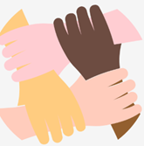
How can I be an ally against Hate?
Ask: You have a better chance at getting things right if you are aware. If you are scared of getting it wrong just ask - but also be prepared to do your own research. Your friends/family will appreciate it if you put in the effort to get information first.
Be Aware of any systemic advantages or ‘privileges’ that you may have. Having privilege does not mean that you have no hardships in life (people with privilege can still experience poverty, illness etc.) however it does mean that you don't face hardship by the nature of your identity. Use this knowledge to be inclusive in action and language.
Challenge prejudice when you see it. As a member of a marginalised group it can be exhausting to constantly be the one holding others accountable. Speak up and speak out when you see or hear others being treated unfairly.
Don’t be defensive: When you ask questions or someone corrects you, your natural reaction may be to become defensive. You know that it wasn’t your intention to offend someone. Be open to feedback - just because something is acceptable or inoffensive to you doesn’t mean that others with different life experience will find it acceptable or inoffensive.
Empathy and listening: Don’t assume that someone wants to talk about their experiences but if they do, try to listen with empathy. Don’t minimize their experience. Being asked ‘where are you from’ might not be upsetting for you but can be very upsetting for someone else as it may suggest that you don’t see them as belonging in Ireland.
